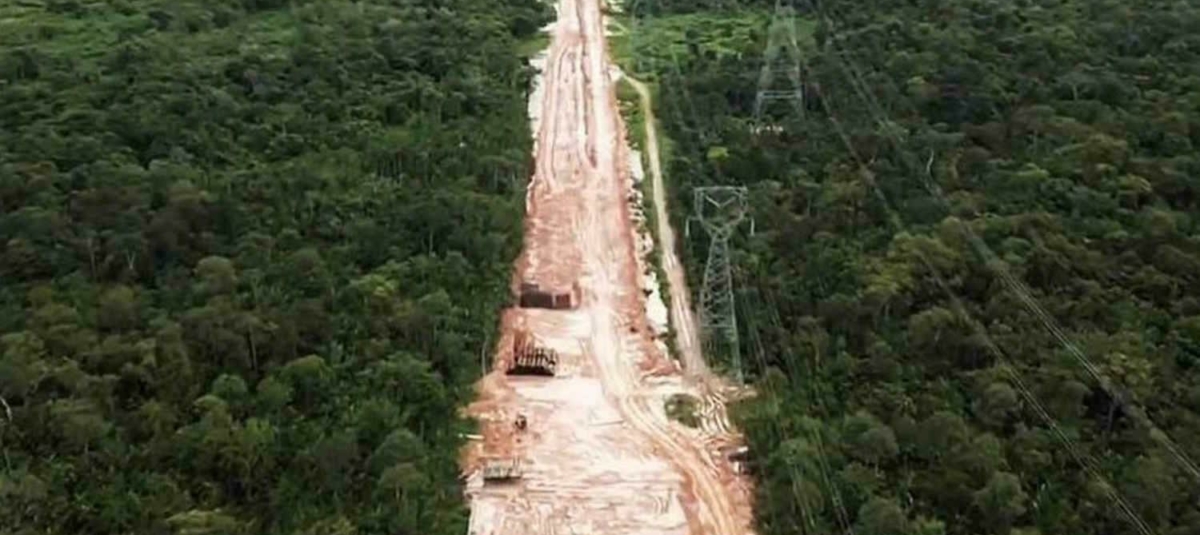As part of the preparations for the upcoming COP30 in Belém, a four-lane highway has been carved through the rainforest to welcome world leaders concerned with forest degradation and climate change. At first glance, it may seem like one of the inevitable controversies that accompany major global gatherings. But the project perfectly captures the mentality behind international attempts to achieve “sustainable” governance. And it echoes the contradictions tied to Norway’s role: protecting the Amazon with one hand, while companies like Hydro poison rivers and communities with the other.
To bring these contradictions into public debate, Latin-Amerikagruppene (LAG) recently organized a discussion in Oslo titled Amazon for Sale? Norway’s Climate Contradictions, gathering activists and researchers with direct ties to affected communities in Brazil alongside Norwegian academics and solidarity actors.
Speakers included Dr. Marcel Hazeu (Federal University of Pará), who detailed Hydro’s impacts in Barcarena; Dr. Susanne Normann (OsloMet), who examined how “green” extractivism reshapes community life; and Alexandre Gomes from Brazil’s Landless Workers’ Movement (MST), who warned against “false solutions” marketed by states and corporations. The panel was moderated by Karen Waneska (NMBU).
Together, they exposed the gap behind Norway’s climate-leader image: its corporate footprint in Brazil tells a very different story.
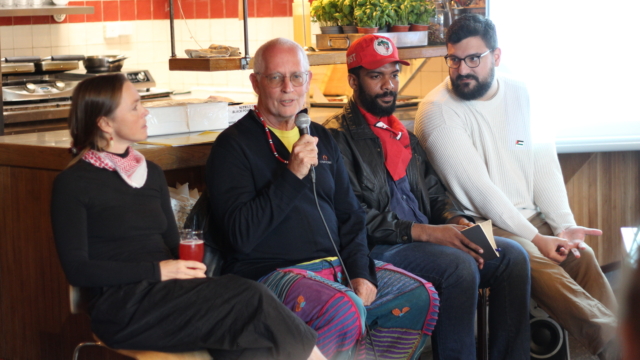
From left: Dr. Susanne Normann (OsloMet), Dr. Marcel Hazeu (Federal University of Pará), and Alexandre Gomes (Landless Workers’ Movement, MST). Foto: Beatriz Ricci Piacenti dos Santos
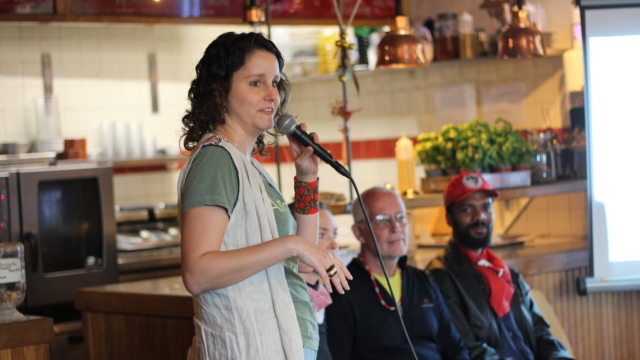
Moderator Karen Waneska (Norwegian University of Life Sciences, NMBU). Foto: Beatriz Ricci Piacenti dos Santos
COP30 in Belém – Hope or Greenwashing Stage?
COP30 will take place 10–21 November 2025 in Belém, Brazil—ten years after the Paris Agreement—offering a moment to judge what countries have actually delivered toward keeping warming to 1.5 °C and meeting their own national climate pledges (NDCs). Belém’s location, a gateway to the Amazon, lends symbolic and political weight, with Brazil presenting the summit as proof that the forest can be a site of solutions and “green development.” Yet preparations already show a familiar pattern: large infrastructure and corporate branding overpowering those who live with the forest. A new highway through protected areas to speed delegates’ arrival has become the emblem of the contradiction—a climate summit paving over the ecosystem it claims to defend—while major firms rebrand as “partners.” In response, Indigenous organizations and social movements are organizing a People’s Summit to center frontline leadership.
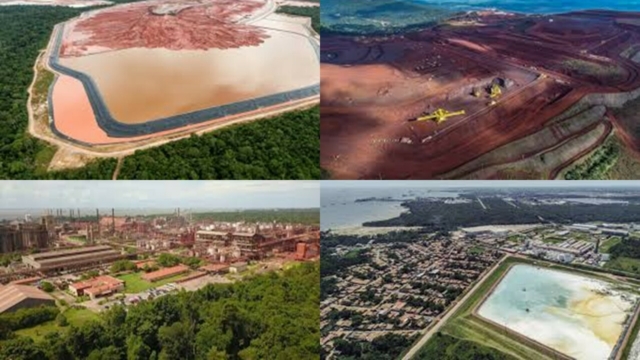
Pollution from Hydro’s alumina operations in Barcarena has turned surrounding forests and rivers into sacrifice zones. Foto: Marcel Hazeu
Norway’s Strategy with Brazil – Partner or Predator?
Norway casts Brazil as its key Latin American partner, pledging cooperation on democracy, trade, climate/food security, and knowledge/innovation. On paper it backs emissions cuts, forest protection, and sustainable agriculture, plus research ties—renewables and cleaner shipping—to align commerce with climate goals. Yet the strategy also pursues “the greatest possible value creation in the Norwegian economy,” expanding market access for Norwegian firms. This dual ambition—green leadership alongside commercial expansion—fuels the critique: without binding accountability and respect for Indigenous and community rights, the partnership risks becoming climate rhetoric that masks extractive realities on the ground.
The Oslo Event and the Barcarena Case — Contradictions Made Visible
Amazon for Sale? Norway’s Climate Contradictions, organized by Latin-Amerikagruppene (LAG) and moderated by Karen Waneska (NMBU), gathered Brazilian activists and Norwegian researchers to unpack how “sustainability” talk can mask extractive realities. The discussion centered on Barcarena, where Norsk Hydro’s operations have turned forest and river communities into zones of sacrifice.
Marcel Hazeu outlined decades of systemic pollution—red-mud spills, recurring incidents, and contamination reshaping daily life—rooted in regulatory capture: permissive licensing, weak oversight, and public subsidies that privatize profit while socializing risk. Corporate philanthropy and certifications, he argued, often function as greenwashing.
Susanne Normann examined the human costs of green extractivism, where new “climate solutions” reproduce old hierarchies and shift burdens onto Afro-Brazilian, Indigenous, and riverine peoples—environmental racism in practice. From the MST, Alexandre Gomes warned against false solutions and pointed to the People’s Summit as a venue where frontline communities set the agenda.
Despite the harms, communities resist through lawsuits, pollution monitoring, and community protocols asserting FPIC. This stance—re-existence—rejects the Amazon as commodity and insists that credible climate action begin with those who live its consequences.
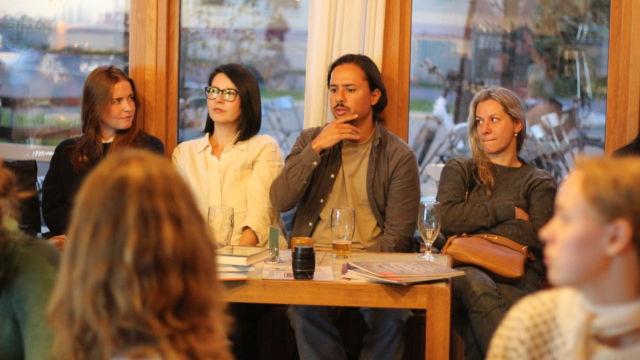
Foto: Beatriz Ricci Piacenti Dos Santos
Not for sale: Lessons from Barcarena
Norsk Hydro’s efforts to present an “eco-friendly” profile while polluting forests and rivers around Barcarena illustrate a broader corporate strategy to rebrand extractive practices. These practices are echoed at the national level: Norway’s Brazil strategy highlights sustainability and climate mitigation while facilitating the expansion of Norwegian companies whose operations have been linked to pollution and high emissions in the Amazon. On the world stage, COP30 exposes the paradox most starkly—“sustainable” climate diplomacy arriving via a highway carved from protected rainforest.
Events like Amazon for Sale? matter because they break the spell of “sustainability” branding by putting lived experience—polluted rivers, cancer clusters, land loss—at the center of the story. They turn abstractions such as environmental racism, offsets, or greenwashing into concrete harms and name the actors involved, building public pressure that PR can’t deflect. The People’s Summit goes a step further: a parallel forum where frontline communities set the agenda, grounding action in rights (FPIC), enforceable corporate due diligence, and support for agroecology and Bem Viver. It doesn’t replace negotiations; it recenters them—insisting that any credible climate solution be accountable to those who bear the risks. In the end, a living forest cannot be saved by the logic that commodifies it; nature is not for sale.
- Associated Press. (2025, May 8). The construction of a road in Brazil draws criticism before first-ever climate talks in the Amazon. https://apnews.com/article/d1f...
- BBC News. (2025, March 12). Amazon rainforest cut down to build highway for COP climate summit. https://www.bbc.com/news/artic... - Latin-Amerikagruppene i Norge. (2024, September 24). COP30 & Norway’s climate contradictions. https://latin-amerikagruppene....
- Ministry of Foreign Affairs (Norway). (2025, May 8). Norway’s Brazil strategy: Partnership for a common future. https://www.regjeringen.no/en/... - NMBU – Norwegian University of Life Sciences. (n.d.). Amazon for sale? COP30 & Norway’s climate contradictions. https://www.nmbu.no/en/researc...
- Reuters. (2025, August 22). Brazil brushes off UN call for hotel subsidy in tense COP30 talks. https://www.reuters.com/sustai...
- Reuters. (2025, October 6). Construction still in progress in Belém as Brazil readies to host COP30. https://www.reuters.com/sustai...
- UN Climate Change (UNFCCC). (2025, April 10). The road to Belém. https://unfccc.int/process-and...
- UN Climate Change (UNFCCC). (2025). Information for COP 30 participants (A–Z). https://unfccc.int/cop30/ifp - UN Climate Change (UNFCCC). (2025, September 30). COP 30 – Overview schedule (Publication No. 649532). https://unfccc.int/documents/6...
- United Nations. (n.d.). COP30. https://www.un.org/en/climatec... - United Nations Development Programme. (2023, May 31). What are NDCs and how do they drive climate action? Climate Promise. https://climatepromise.undp.or...
- United Nations Development Programme. (2025). COP30: The UN Climate Change Conference. Climate Promise. https://climatepromise.undp.or...
